| Guatemala | Live International Training Workshop Held in Guatemala |
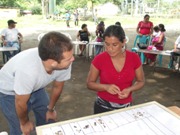 | The live workshop that began on September 28 in Guatemala was a wonderful success. We had participants from Europe, North America, and Latin America.As the week long live workshop was part of the two-month long blended training program some participants did two needs assessments in communities in their home countries. Other participants came to Guatemala two days early and did their needs assessments in a Guatemalan community partnering with a local Guatemalan NGO: Fundasistemas. |
| Union Huista | A Community of 134 Coffee Farming Families |
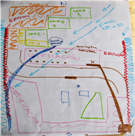 | The 134 families that live in this community are coffee farmers – and were represented in the two needs assessments by 14 members of the community—one half of them women and one half of them men. These families were displaced during Guatemala Civil War in the 1980s and were unable to return to their farmlands at the end of the Civil War—so the government relocated them in 1998 to this new village location.The two needs assessments were facilitated by Oscar Recinos of FundaSistemas and Tim Magee of the Center for Sustainable Development. |
| 10 Seed technique | Identifying and Prioritizing Community Need |
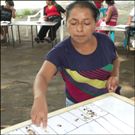 | The first needs assessment was a participatory needs assessment using the 10 seed technique to discover and prioritize basic community and family needs. The 14 community representatives were able to discuss different needs within the community. We listed the needs that they described (12 needs were agreed upon as being the most important for voting purposes)and at the end of approximately 2 hours when they had exhausted their ideas we transferred them to a large sheet of paper. Each of the participants was then given 10 coffee beans to use as voting tokens to be placed on the needs that were the most important to them. They could put all 10 tokens on one need—or they could distribute them between several different needs. |
The prioritized needs were then listed – and then the participants discussed them for another hour to make sure that they were comfortable with the prioritization as shown with the number of votes each challenge received:
| PCVA | Identifying Climate Hazards and Community Vulnerabilities |
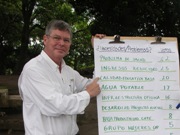 | The second assessment is called a Participatory Vulnerability and Capacity Assessment—and is designed to find out from community members what sorts of hazards they face. These could include earthquakes, flooding, fire, or torrential storms. We were also interested in finding out their perception of changing climatic conditions. |
| PCVA Process | Mapping, the Annual Calendar, and the Historical Timeline |
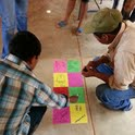 | The weekend workshop had four components—three for gathering information in the fourth for compiling the information:
|
| Problem Tree | Monday: Compiling the Prioritized Community Challenges |
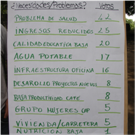 | On Monday morning the official workshop began with participants either bringing their needs assessments from their own villages or from the two day pre-workshop session in Union Huista. The first thing that we did was for each team to compile the information from their assessments into a simple project outline which defined the main problems, their underlying causes—and their negative impacts. Over the course of two days the teams investigated scientific climate information for their community’s location and compared it to the local knowledge collected from their community members. The teams then began researching evidence-based solutions to their community’s challenges and expanded their project outline to include these solutions. We have chosen to feature three Guatemalan teams and their three different project outlines. |
| Guatemala | Team One: Lea Ritter (Guatemala/Germany) and Jesus Gomez Sanchez de la Fuente(Spain/US) |
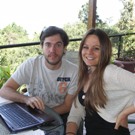 | Team one focused on a project designed to improve coffee production using:
|
| Guatemala | Team Two: María Lucrecia Morataya (Guatemala/Fundaeco) |
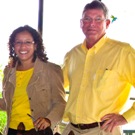 | Team two focused on health and hygiene challenges, low income levels within the community and malnutrition using the following solution oriented programs:
|
| Guatemala | Team Three: Oscar Recinos(Guatemala) and Angelito Narciso (Philippines/Canada) |
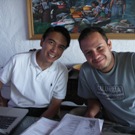 | Team three focused their solution oriented programs on community wide health challenges:
|
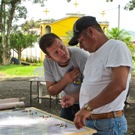 | This blended training program includes 5 days in the field. In this training we will lead you through the development of a real project, in real time, in a real village, and leave you with the practical field tools to sustain it. Follow link for detailed syllabus.
|
Copyright © 2008-2024, Center for Sustainable Development, Inc. All rights reserved. CSDi is a U.S. registered 501(c)(3) nonprofit organization that specializes in providing sound, evidence-based information, tools and training for climate change and sustainable development for development and nonprofit professionals worldwide. Visit our training catalogue.